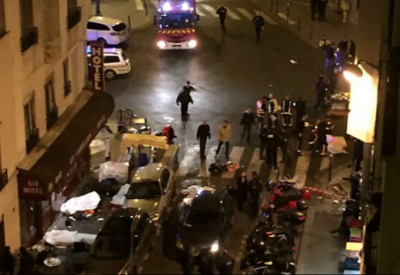Ripples of Grief
November 14, 2015
One death diminishes all of us, and the tragic and senseless murders in Paris yesterday (November 13th 2015) send ripples of grief outwards from those closest to each victim, into the edges of the civilised world. Can there be a philosophical response to such violence? Here we need to find a way forward – a way of encountering such horror that is both psychological, and moral. It is perhaps another generation which, through education, must try to succeed where the older generation has so obviously failed.
- The Reality of Violence. In Stephen Pinker’s Better Angels of Our Nature he assembles a huge weight of evidence to
 demonstrate how violence has declined in our lifetimes. There are fewer wars and they are smaller in scale: murder rates in the UK are declining year on year and random acts of violence similarly fall. We seem to be making progress at least in an aggregate sense: but nonetheless, terrorist violence appears to be on the rise, and random, suicidal violence is particularly visible and horrifying.
demonstrate how violence has declined in our lifetimes. There are fewer wars and they are smaller in scale: murder rates in the UK are declining year on year and random acts of violence similarly fall. We seem to be making progress at least in an aggregate sense: but nonetheless, terrorist violence appears to be on the rise, and random, suicidal violence is particularly visible and horrifying. - The Philosophy of Violence. Philosophers from Augustine to Aquinas have grappled with the justification of killing in war and religious leaders from Buddha to Jesus to Muhammed have contemplated the morality of violence. I believe Jesus probably was a pacifist – blessed are the peacemakers, he said – and the Qur’an suggests that Allah requires justice in war– do not kill the innocent in war, and be gracious to your enemy. Muhammed taught Do not be people without minds of your own, saying that if others treat you well you will treat them well, and that if they do wrong you will do wrong. Instead, accustom yourselves to do good if people do good and not to do wrong if they do evil.'(Sunan At-Tirmidhî) So it is a basic error to see this violence as inherent in Islam – it seems, rather, to be part of a worldview, a way of perceiving reality, which can be loosely described as ‘medieval’.
- The Sociology of Grievance. However, I believe that world leaders fail to confront the core issue that drives violence so often, and that is a sense of injustice and long-standing grievance. This denial of civil rights underlay the rise in terrorism in Northern Ireland. In her new book, Fields of Blood, Karen Armstrong traces the present upsurge in Islamicist terror to two invasions: the invasion of Afghanistan by the USSR in 1982 (when the western powers supplied the mujahaddin), and the invasion of Iraq in 2003. Both events were portrayed by our enemies as forms of imperialist violence – the USSR was defeated in Afghanistan, leading eventually to the Taliban Government of 1996-2001 (toppled by a second invasion, this time by the US and Britain), and the Iraq war has bequeathed a legacy of tribal and religious divisions as the Shiite majority took power from the minority Sunnis (formerly led by Saddam Hussein).
But of course it is more complex than this: within these broad influences we find other political, quasi-religious and tribal struggles which are embedded deeply in the history of the Middle East.
We desperately need to understand these causes, unpalatable though this exploration may be, if we are to find a way of bringing healing to the nations.






0 Comments